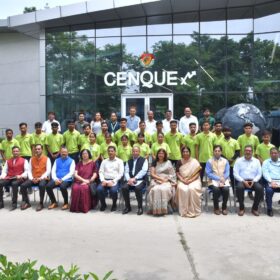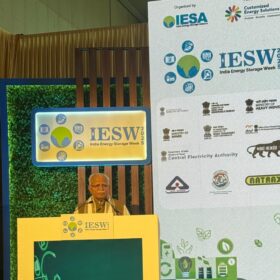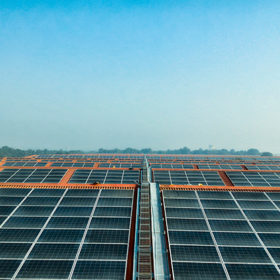“Energy storage will account for half our business within three years”: Geon vice president
Khushi Kabra, Vice President–Strategy at Geon (formerly Battrixx), speaks to pv magazine on pivoting from electric vehicle (EV) batteries to building a strong foothold in the energy storage space.
How is India’s power infrastructure evolving amid global supply chain shifts?
With renewable capacity expanding, grid upgrades underway, and policies fostering local supply chains, India is navigating a complex but promising energy transition.
India installed record 21.9 GW of solar and wind capacity in H1 2025: JMK Research
The nation added 18.3 GW of solar capacity and around 3.5 GW of wind capacity during the Jan.–June period of 2025, according to JMK Research.
Tata Power inaugurates green energy skilling centre in Delhi
Tata Power’s Green Energy Skill Centre will impart training in renewable energy technologies, including solar PV system installation, commissioning and operation and maintenance, energy storage, pumped hydro storage, and electrical safety to prepare future-ready green energy workforce for the country’s energy transition.
“India on track to achieve 50% renewable energy milestone by year-end”: Union power minister
“India is on track to achieve the milestone of 50% renewable energy share in its total installed power generation capacity by the end of the year,” said union power minister Manohar Lal Khattar at the 11th edition of India Energy Storage Week (IESW) 2025.
Powering a greener future through India’s clean energy transition
As India adds more intermittent renewables like solar and wind to its energy mix, modernising the electricity grid becomes a priority. Grid expansion, integration of battery storage systems, and digital monitoring tools are critical to accommodate fluctuations in generation and demand.
India installed 17.4 GW utility-scale solar, 5.15 GW rooftop PV capacity in FY 2025: JMK Research
Rajasthan led the annual solar additions with 6.5 GW, followed by Gujarat (3.6 GW) and Maharashtra (2.3 GW).
Tata Power Renewables installs 45,500 rooftop solar systems with 220 MW capacity in Q1 FY26
With Q1 FY26 additions, Tata Power Renewable Energy Ltd has crossed the milestone of over two lakh rooftop solar installations, bringing its cumulative installed capacity to 3.4 GW.
Photovoltaics for atmospheric water harvesting
A scientist in Turkey has simulated eight PV-supported hybrid atmospheric water harvesting systems and compared their performances. They were all considered to operate with R1233zd(E), R1234yf, and R600a, as well as R32 refrigerants. The required PV system size was as low as 20 m2.
The impact of module pricing on solar project viability: Trends and predictions
India’s solar sector faces rising module costs due to recent developments, including the imposition of anti-dumping duties on solar glass and China’s reduction in export rebates on solar modules, impacting project viability. These shifts underline the delicate balance between promoting local manufacturing, pursuing geopolitical strategies, and navigating the economic realities of global trade.














